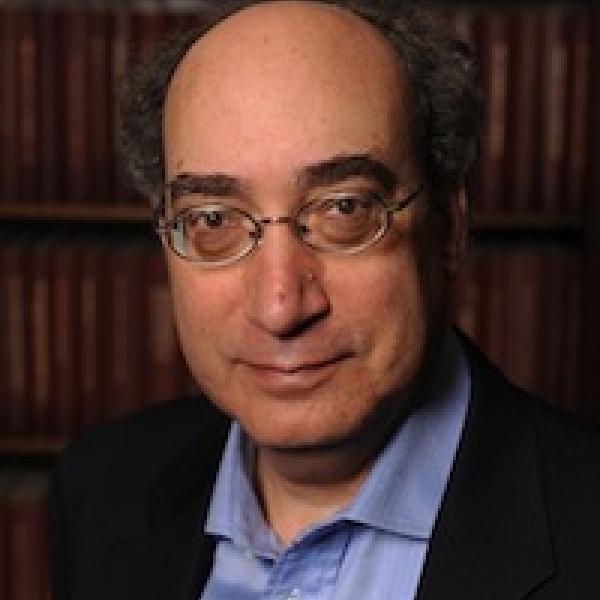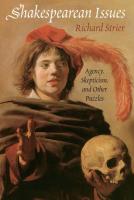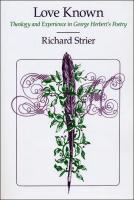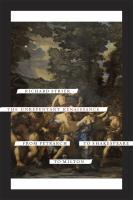
Biography
My passion is to bring together two modes of literary study that have, traditionally but needlessly, been seen as antagonistic: formalism and historicism. I am deeply interested in the intellectual history of the early modern period, especially theological and political ideas. I am interested in the ideas themselves but even more in the ways in which they find their way into English and American literature in the period. My book on George Herbert attempts to demonstrate how deeply the central ideas of Reformation theology are at work in the intricate tonal and structural details of the lyrics. My second book, Resistant Structures, brings together methodological and historical concerns. It critiques and tries to work free of various critical and historical schemes and presuppositions; it refuses to idealize "devout humanism" and it refuses to see the thought-world of early modern England as fundamentally conservative and deferential to authority. My next book, The Unrepentant Renaissance from Petrarch to Shakespeare to Milton, continues the endeavors of historical and intellectual revision, including chapters on literary, philosophical, and religious texts from the whole Renaissance period that praise such things as passion, impatience, worldliness, and pride. Shakespearean Issues: Agency, Skepticism, and Other Puzzles shows Shakespeare grappling with, and sometimes taking positions on, various intellectual and social issues. Like its predecessors, it contravenes many widely-held views.
My teaching, especially at the graduate level, has followed the whole range of my interests, including poetry up to the present (see below). I have directed over 40 dissertations on topics ranging from villain heroes to representations of taverns to the poetics of inarticulateness in Herbert, Dickinson, and T. S. Eliot.
Select Publications
- Shakespearean Issues: Agency, Skepticism, and Other Puzzles (University of Pennsylvania Press, 2022).
- The Unrepentant Renaissance from Petrarch to Shakespeare to Milton (University of Chicago Press, 2011); Winner, Warren-Brooks Award, Center for Robert Penn Warren Studies.
- Resistant Structures: Particularity, Radicalism, and Renaissance Texts, The New Historicism: Studies in Cultural Poetics 34 (University of California Press, 1995); paperback, 1997.
- Love Known: Theology and Experience in George Herbert's Poetry (University of Chicago Press, 1983); paperback, 1986.
- (ed. with Bradin Cormack and Martha Nussbaum) Shakespeare and the Law: A Conversation Among Disciplines and Professions (University of Chicago Press, 2013, forthcoming).
- (ed. with Derek Hirst) Writing and Political Engagement in Seventeenth-Century England (Cambridge University Press, 1999).
- (ed. with Donna B. Hamilton) Religion, Literature and Politics in Post-Reformation England, 1540-1688 (Cambridge University Press, 1996).
- (ed. with David L. Smith and David Bevington) The Theatrical City: Culture, Theatre and Politics in London, 1576-1649 (Cambridge University Press, 1995); paperback edition, 2002.
- “A Field Guide to Robert Hass,” in Evaluations of U.S. Poetry since 1950, ed. Robert von Hallberg and Robert Faggen (University of New Mexico Press, 2021), vol 2 (Mind, Nation, and Power), 119-143.
- "Happiness" in Shakespeare and Emotion, ed. Katharine A. Craik (Cambridge U Press, 2020), 275-287.
- "King Lear and Social Security," Raritan 40:2 (Fall, 2020): 63-72
- “The Unity of the ‘Songs and Sonnets’’ in John Donne in Context, ed. Michael C. Schoenfeldt (Cambridge University Press, 2019), 68-84.
- "Paleness versus Eloquence: The Ideologies of Style in the English Renaissance,” Explorations in Renaissance Culture 45 (Fall, 2019): 91-120.
- "Martin Luther and the Real Presence in Nature," Journal of Medieval and Early Modern Studies 37 (Spring, 2007), 271-303.
- "How Formalism Became a Dirty Word, and Why We Can't Do Without It," in Renaissance Literature and Its Formal Engagements, ed. Mark Rasmussen (Palgrave Press, 2002), pp. 207-215.
- "Milton's Fetters, or, Why Eden Is Better than Heaven" in John Milton: The Author in His Works, ed. Michael Lieb and Albert Labriola, Milton Studies 38 (2000), pp. 169-197 (reprinted, in revised and updated form, in The New Milton Criticism,” ed. Peter Herman and Elizabeth Sauer (Cambridge University Press, 2012, pp. 25-48]).
- "John Donne Awry and Squint: The 'Holy Sonnets,' 1608-10," Modern Philology 86 (May, 1989), 357-384. [Featured in Margaret Edson's Wit, which won the Pulitzer Prize for Drama in 1999].
Courses Taught
2017-2019 Courses: Winter, 2019, The Sonnet from Petrarch to the Present (undergraduate); Winter 2018, Emily Dickinson's Poetry (mixed graduate & undergraduate)
Graduate: Women Poets of the Seventeenth Century; Shakespeare and Skepticism; Society and Politics in Shakespeare's Plays; Shakespeare's Venetian Others (co-taught with a historian); The New Historicism in Renaissance Studies; Modes of Renaissance Lyric; "Metaphysical" Poetry (many times); Renaissance Intellectual Texts from Petrarch to Descartes (a number of times); The Religious Lyric in England and America from Donne to Hopkins to T. S. Eliot; Cavell and Criticism (co-taught with a philosopher).



